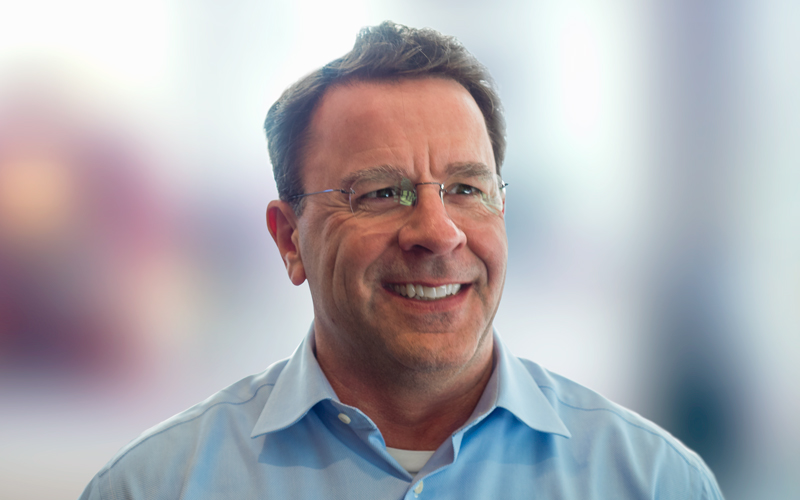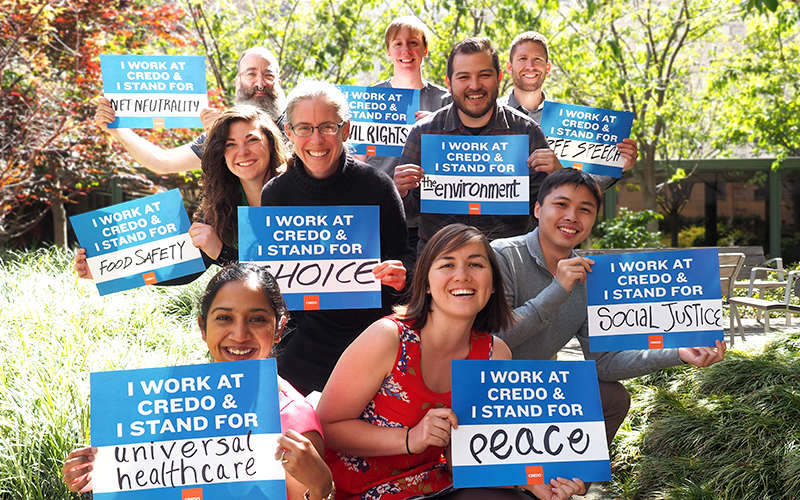This interview was sponsored by CREDO Mobile. See below for more information.
In 1985, at the height of the Reagan era, before anyone was talking about “social enterprises,” three progressive activists launched a for-profit business to fund the causes they cared about. They began with credit cards in the 1980s, added long-distance service in the ‘90s and in 2000, launched a mobile phone service. That business — now called CREDO — sees itself first and foremost as a progressive activism and philanthropic organization with over 4.4 million members in its action network. CREDO Mobile, a progressive phone company, funds that activism work.
“Our customers purchase wireless phones and service from us, like any other mobile company,” CREDO Mobile CEO Ray Morris explains. “The difference is they know that a portion of our revenue supports the progressive causes they believe in and funds a team of progressive activists who are constantly pushing to influence important issues.”
To date, the combined businesses have given away more than $81 million to progressive groups. Every month, CREDO’s members vote on how to divide $150,000 among three progressive organizations, and CREDO Action, the activism group, mobilizes millions of Americans on issues like trade, the environment, economic justice and civil liberties. We spoke with Morris to learn more about how the company operates and what makes it special.
CREDO Mobile At A Glance
Location: San Francisco, CA
Founded: 1985
Employees: 100
Impact: $81 million donated to progressive causes in the company’s lifetime
Interview With CEO Ray Morris

CREDO Mobile CEO Ray Morris
What do you believe has been the most critical element to your organization’s success to date?
Ray Morris: Our values truly inform our work. We are a company that lives our progressive values every day. I’ve been here a short time , but I can tell you that in the interview process, the portions of time that we spent really ensuring that I was aligned, relative to my values and my belief system, were greater than the time spent going through my work history.
When recruiters and our internal HR team are looking for new hires, the very first thing we’ll talk about with candidates is: “Where do you stand on these issues? What does ‘progressive’ mean to you?” Not so much to determine where someone’s going to rate on a progressive scale, just to make sure that there’s a fit. It would be a horrible thing for us to hire someone and to have them learn on their first day that we’re the largest corporate sponsor of Planned Parenthood, for example. If they didn’t have the same belief system, that would be uncomfortable for everyone.
How do you define progressive?
RM: Sometimes people will say, “Like who?” And we can say, “Like Elizabeth Warren. Like Bernie Sanders. Like Jeff Merkley,” and a lot of other people in the political spectrum. But we can also say, “Like NARAL . Like Planned Parenthood. Like Doctors Without Borders. Like Amnesty International. Like Earth Justice.”
We’re about the environment. We’re about civil liberties. We’re about economic justice. We’re about women’s rights and the rights of minorities. And so that broadly defines to us what we mean by progressive.
How do you pick the causes? You mentioned members get to vote on which ones get funding, but how do groups get on that list?
RM: Groups send us grant requests every month. We have dedicated people in our activism team who vet all of the groups and causes, filter through them and pick several slates. Then a group of us, representing every department in our company, goes through and votes on the slate we want to put up for our members to vote on. It’s a very serious meeting, as you can imagine. No matter what your role is in the company, you’re active in the progressive community and have an opinion, so those are strong, spirited debates.
We let the winning group of three grantees know that they are being featured for the month, and then our members vote. The percentage of the vote that each group gets determines how we divide the $150,000 each month.
I’m curious about the $150,000 number. Does that stay steady? Do you look at it every year? Why is that the amount?
RM: We do look at it every year, and it’s a set percentage of our gross income. The founders made it a percentage of our gross income on purpose to make sure that our organization is very lean behind-the-scenes to be able to provide the donations that we do.
You have this very clear outward-facing work that you do with the progressive causes. How do you keep that consistent inside the company?
RM: It’s impossible to separate our values outwardly from our values internally. Just as we want to make sure that we’re vetting all of these groups and causes we fund, we also want to apply all of those same quality filters to our own work. Is everything that we’re doing as good as it can possibly be?
We’re on the largest 4G LTE network, for example, and that’s all about making sure that the quality of our product is great. When someone calls our customer service department or any places that touch us, that quality matters. Or, even, our partners with whom we work — we make sure that the processes for receivables and payables and all of those are great.
Then with our employees, it’s also about, “How good can I be as a leader?” and everyone is held to the same standards. It’s all about hiring and developing great people, putting as much resource, time and effort as we can into giving people the space and the tools to be great at what they do, empowering them and then stepping out of the way to make sure they can be as great as they aspire to be and then encouraging them when they want to take chances and go in new directions.
Do you have practices around supply chains or employment practices or anything like that where you’re trying to also address those issues through how you’re acting as a business?
RM: To the extent we can. Some of our partners are corporations that are orders of magnitude larger than we are, and so we align ourselves as well as we can. For example, we would never use the services of AT&T.
Internally, our CREDO Action team’s jackets, for example, have the union bug on them. There are some ways that we express ourselves that are important to us. So where there’s an opportunity for us to live our values, we certainly do that.
What accomplishments that CREDO’s achieved over the years are you proudest of so far?
RM: What I’m most proud of is our philanthropic work, the organizations that we support and the work that they’re doing. These are real organizations with people on the ground doing great work for people in this country, period. We’re very, very proud of what we’re able to do, and the help that we’re able to provide.
We’re also proud of our role in political victories. For example, a lot of people here were quite invested in getting the Keystone XL pipeline stopped, and in fact, many of our own employees and the former CEO were arrested protesting Keystone. When that project was stopped, that was considered a great victory for us.
More recently, we achieved a big win when our Action team put together a video of Michelle Obama delivering an amazing speech to young women. We got 39 million views on that video. The comments that came back, the young women who felt empowered by that presentation, by that speech – that, to us, is success.
What trends do you see in your industry looking forward?
RM: The wireless industry is becoming more and more commoditized. This isn’t just my opinion — this is a fact. There’s still a vast difference in the actual quality, but the perception is that it’s all the same. Our role then is to ensure people know the difference. But even more importantly, we need to make sure we’re laser-focused on being the best activism and philanthropic organization in existence. We believe this will be the difference that makes the choice easier.
What are the biggest challenges that you’re facing right now as a company, and what are you doing to address them?
RM: For me, it’s how do we as a company grow, inspire and influence the important decisions we now face? We want to grow the progressive movement. We want to grow the donations that we give each month to great organizations and grow the engagements of the progressive community. We want to inspire people to believe that they can make a difference.
I believe every single one of us has a voice, an important voice, and our purpose is to amplify those voices. We want to create a greater degree of influence in the important discussions that are shaping our country and its direction. We will continue to do the great work of CREDO Action. We’ll continue to partner with great activism and outreach organizations, but we also need to ensure that we’re continually growing the channels where our collective voices are heard, continually engaging communities to press for the values that are important to us.
Lessons Learned
Ray Morris’s top three pieces of advice for mission-driven companies
1) Quality matters. Everything you do, every product, service or interaction, should be as good as it can be. We must be nearly fanatical about continuously improving those experiences.
2) The cause matters. The work we do is important. We also have to make a difference in the world.
3) The product matters. It’s obvious, but people lose sight of this. Beyond the cause, we have to be selling a product that people want to buy. I believe we do that.
About this sponsored post
One of our core values at CONSCIOUS COMPANY is transparency. Transparently, this interview was produced by our editorial team as part of a paid partnership between CREDO Mobile and CONSCIOUS COMPANY. This partnership directly supports our work here at CONSCIOUS COMPANY and we deeply appreciate the CREDO Mobile and all they do for us and the world. Interested in supporting our work and getting the word out about your company? Find more information about partnerships here.





